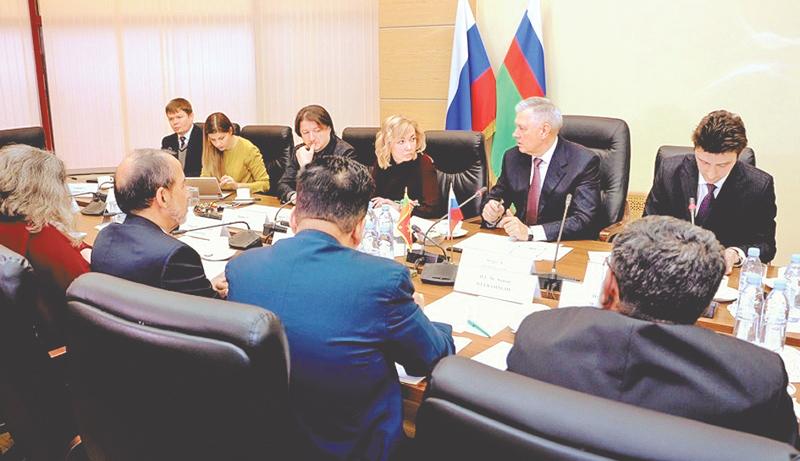
Sri Lankan tea exporters were faced with something more than a storm in a tea cup when Sri Lanka’s biggest tea buyer Russia imposed a temporary ban on all plant-origin product imports from Sri Lanka.
On the 18th of this month the Embassy of Sri Lanka in Russia was informed that the “Russian government, namely the Federal Service for Veterinary and Phytosanitary Surveillance (Rosselkhoznadzor), had imposed a ban on all the plant-origin product imports from Sri Lanka, because of the Khapra beetle discovered in a tea shipment that arrived from Sri Lanka,” Dr. Saman Weerasinghe told the Sunday Observer. Clearing the picture of which several accounts of the incident was reported on several channels, the Sri Lankan Embassy in Russia stated that in all official documents, including the press release published on the official website of the Rosselkhoznadzor, it was mentioned that this pest had been found in the packaging material.
According to the statistics, the brand, Ceylon Tea, which is a popular beverage, carries over 65 percent of Sri Lanka’s total exports to Russia. In the year 2016 Sri Lanka’s tea exports to Russia consisted of 34 million kilos of tea which amounted to a value of US$ 146 million. Immediately after the temporary ban was imposed by the Russian authority, the Sri Lankan Embassy in Russia took the initiative to work closely with the relevant parties to find solutions and remove the temporary ban.
By December 25, an official delegation from the Sri Lanka Tea Board including the Russian Ambassador, Dr. Saman Weerasinghe met with the Russian Federal Service for Veterinary and Phytosanitary Surveillance (Rosselkhoznadzor) to discuss the temporary restrictions imposed by the Russian Federation on imports of plant-origin products from Sri Lanka on December 18, 2017.
The delegation representing Sri Lanka was led by the Sri Lanka Tea Board (SLTB) Chairman, Rohan Pethiyagoda, and the Ambassador of Sri Lanka to the Russian Federation, Dr Saman Weerasinghe, while the Russian counterpart was headed by the Head of the Rosselkhoznadzor, Sergei Dankvert.
As a result of fruitful and productive negotiations, the Russian side announced its decision to lift the restrictions with the effect from December 30, 2017. “This result was achieved thanks to the mutual and timely cooperation between the state authorities of Sri Lanka and the Russian Federation within a period of one week since the announcement of the restrictions,” the Russian Embassy said in a statement issued. The most positive influence in this regard was the official letter of President Maithripala Sirisena, to the President of Russia, Vladimir Putin on the subject of the imposed restrictions.
Explaining the process that took place to successfully lift the ban, Ambassador Dr. Weerasinghe further explained that the Embassy of Sri Lanka in Russia forwarded letters to the Minister of Foreign Affairs of Russia, Sergey Lavrov, and the Deputy Minister of Agriculture of Russia, Ilya Shestakov, and the Chairman of the Russian Side in the Sri Lanka-Russia Intergovernmental Commission on trade, economic, scientific and technical cooperation, drawing their attention to the situation.
Without a doubt, the official negotiations conducted on December 25 between the technical expert delegation from the Sri Lanka Tea Board led by Rohan Pethiyagoda, SLTB Chairman, and officials from the Russian Federal Service for Veterinary and Phytosanitary Surveillance (Rosselkhoznadzor) became the turning point in the resolution of the issue, as the two parties had an opportunity to discuss all the details and come to a consensus on the conditions under which the temporary restrictions could be lifted. As a result, Sergey Dankvert, Head of the Rosselkhoznadzor, announced their decision to withdraw the restrictions with the effect from December 30, 2017. Dr. Weerasinghe says, this is the first time in history when an issue of such importance and magnitude was resolved within a few working days, although normally it would take at least two or three months.
“As far as I can tell, it means that both, Sri Lankan and Russian authorities succeeded in beginning direct and solid communication right away and were interested in the earliest withdrawal of the restrictions, considering that the ban was damaging not only for the Sri Lankan but for the Russian economy as well,” he added.
Other major key role players included the Ministry of Foreign Affairs of Sri Lanka, Ministry of Plantation Industries of Sri Lanka as well as the Department of Agriculture. These Sri Lankan authorities and the Embassy of the Russian Federation in Sri Lanka took enormous efforts, aiming at the prompt lifting of the ban, and organized a visit by an expert delegation to Russia. When asked if there were any terms and conditions put forward by the Russian authorities in order to lift the ban Dr. Weerasinghe said, several actions and measures were put forward in order to ensure that a similar incident would not occur in the future.
Accordingly, all shipping containers shall be thoroughly cleaned and disinfected under the supervision of the National Plant Quarantine Service prior to stuffing, in order to ensure that they contain no plant matter or pest species. The Phytosanitary certificate issued by the National Plant Quarantine Service for every shipment shall specifically certify the inspection for and the absence of khapra beetle, including its larval forms.
It was also undertaken that the Sri Lanka Tea Board and the National Plant Quarantine Service will conduct regular inspections of warehouses and other sites in the supply chain to ensure that no pest species of concern to the Russian Federation become associated with any product to be exported to Russia.
